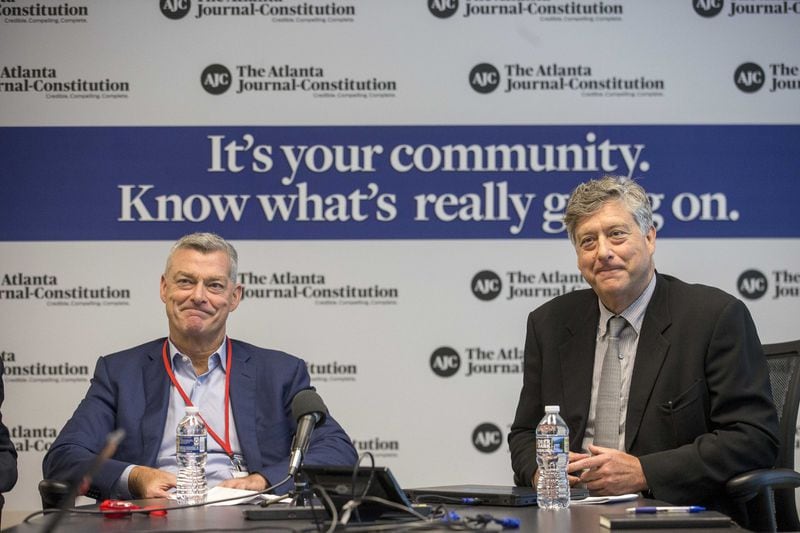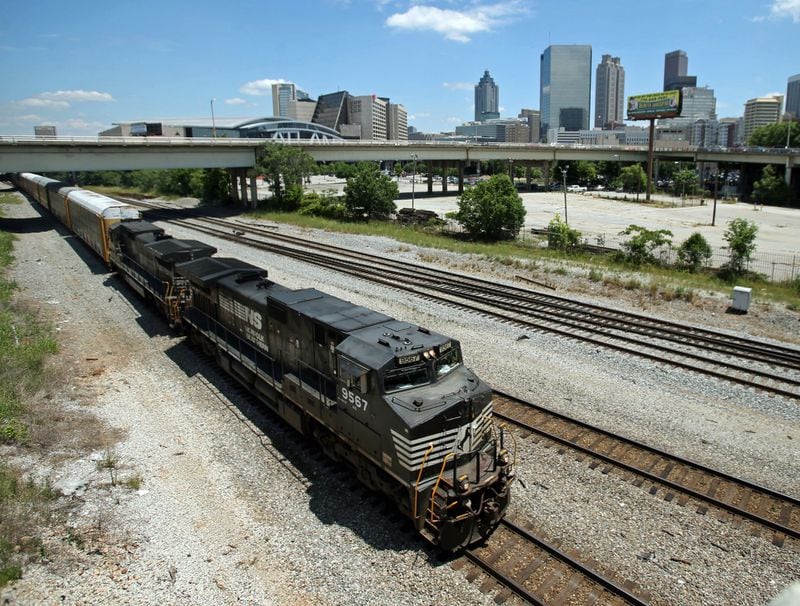Amid growing frustration that their deal to transform downtown’s Gulch is caught up in the crosscurrents of Atlanta City Hall politics, CIM Group and its partners stepped up their push this week to convince City Council and the public to support their planned $5 billion development.
The development team and allies have purchased radio ads and launched a social media blitz under the banner "Greenlight the Gulch," with a corresponding website, to sell residents on a project. Mayor Keisha Lance Bottoms pulled a planned vote this month lacking council support.
Members of council have raised concerns about the rush to consider the complex deal and the amount of public financing involved in the project — which could climb to $1.75 billion — while others have questioned whether public benefits such as affordable housing are sufficient.
Eight members, a majority of the body, have co-sponsored legislation seeking an outside review of the proposal, a delay that Bottoms said could scuttle a deal.
This week, Richard Ressler, co-founder of CIM and other deal supporters, met with council members, pitching the project as a chance to revitalize downtown.
On Thursday, Ressler and his brother, Atlanta Hawks lead owner Tony Ressler, visited reporters and editors of The Atlanta Journal-Constitution for about two hours to lay out their case for a project whose benefits and risks, they said, have been misunderstood.
Richard Ressler said the risk falls on his company, not taxpayers.
He called public benefits negotiated by the city, including affordable housing and a citywide economic development fund, “unprecedented.”
The proposal relies on bonds backed by two sources of public funding: 5 cents of the city’s 8.9-cent sales tax generated from future sales on the Gulch site, and future expected increases in property taxes from the development, which lies in a zone known as a tax allocation district or TAD.
Those dollars don’t exist today, Ressler said, and he emphasized four of the five cents are state tax dollars. The overall financing, he said, would come at no credit risk to the city because CIM is on the hook for the debt.
Development will rely on a massive $500 million concrete and steel platform to create up to 15 new downtown blocks that can be developed 40 feet above the existing Gulch.
“Our goal is this will be the connector for parts of the city that haven’t previously interacted,” Ressler said. “This is a substantially more expensive process of building than building on land at [an established] place that already exists.”
The city doesn’t have the money to build the platform, so CIM will pay for it up front, Ressler said. But he said CIM needs the protection of future tax revenues to recoup the expense to put billions of dollars of its investors’ money at risk.
The deal faces stiff opposition.
Julian Bene, a former board member of Invest Atlanta, the city’s economic development agency, has called the proposal the “worst deal” he’s seen in his career, and a “giveaway” to the developers.
Spending by tourists and residents at shops in the Gulch project would simply move from areas where full sales tax goes to government, and put it towards a new development. Public benefits such as affordable housing and job training, he said, amount to about $100 million, while the developer could reap future taxes totaling into the billions.
“If CIM does not get this deal, the demand for office [and other development] will be met by developers in places where new construction pays taxes” into the general fund, he said.
CIM’s interest in the site started when Tony Ressler and partners acquired the Hawks in 2015. He encouraged CIM to scout the Gulch. Norfolk Southern, which owns land CIM wants to purchase, has had the property for sale for years without any prior serious bidders.
The clock is ticking for the partners to ink a deal with the city, Fulton County and Atlanta Public Schools. Norfolk Southern wants to sell its land to help fund a new headquarters, which could come to Atlanta, but the land purchase could be threatened by delays, the partners said.
“If it doesn’t work, I’ll go to the next city and do another project,” Richard Ressler said. “It won’t be the end of the world. It would be sad for Atlanta to lose this opportunity.”
Tony Ressler expressed frustration that incentives for the project received state approval last year, but the deal has been met by skepticism by the community and at City Hall. He dismissed arguments about displacement of tax revenues and said the project will help capture spending from tourists who come to downtown for events, but have nowhere go afterwards.
“Do we prefer what we have or what we could have,” he said.
A.J. Robinson, CEO of downtown business coalition Central Atlanta Progress, called the city “a fragile political stew,” with seven new council members, a new administration and the overhang of a federal corruption investigation focused on the administration of former Mayor Kasim Reed.
Robinson said the developers are “very close” to getting the eight City Council votes needed to approve the deal.
Matt Westmoreland, a citywide councilman who supports the outside audit, met with Richard Ressler on Wednesday and Tony Ressler on Thursday.
“The amount of public subsidy is a really big number,” he said. “I appreciated getting the chance to hear why (Richard Ressler) is interested in Atlanta.”
Howard Shook, a councilman who represents Buckhead, said Wednesday he remains opposed to the deal and said he doesn’t think a majority of council supports the current deal.
At a Wednesday night public hearing, the crowd was a mix of supporters and opponents.
“There are some who say this is not enough,” Bottoms said of those critical of the public benefits, “and to them I say revolution is not a one-time event.”
One agreement won’t fix the city’s problems, she said, but the Gulch deal addresses many pressing concerns.
But former state Sen. Vincent Fort said the community feels shut out by a deal thrust upon them. He said the deal doesn’t go far enough to prevent displacement, calling it an “engine for gentrification.”
“They don’t understand how angry people are about this deal,” he said.
GULCH REDEVELOPMENT
Scope: Developer CIM Group outlined a project of $3.5 billion to $5 billion. The CIM proposal could grow to more than 9 million square feet of office space, 1,000 residences, 1,500 hotel rooms and 1 million square feet of retail space.
Partners: California-based CIM was co-founded by Richard Ressler, whose brother Tony is the lead owner of the Atlanta Hawks. The Hawks also are a Gulch partner. |Incentives: Documents obtained by the AJC project public financing of $900 million to $1.75 billion, though those figures could grow. It would be funded by a portion of sales taxes generated on-site and bonds backed by expected future increases in property taxes.
Community benefits: CIM has agreed to a package of affordable housing commitments, jobs training and other community benefits, including: $28 million investment in a citywide affordable housing trust fund; the greater of 200 residential units, or 20 percent of the total built, set aside as affordable for people making 80 percent of the area median income (or a 1 bedroom rent of about $1,100); $12 million toward an economic development fund; $12 million for a new fire station; a new Atlanta police mini-precinct; $2 million to an Atlanta Committee for Progress workforce program; 38 percent minority-and women-owned business participation and 10 percent equity in the project to minority and or women-owned businesses.
OUR REPORTING
The AJC first reported the city and CIM Group’s talks on a potential 10-figure public financing package for the Gulch project. AJC reporters have also looked at the potential costs and community benefits of the up-to-$5 billion project that could remake a 40-acre site into a mix of offices, retail, hotels and residences. The matter could return for City Council consideration in the coming weeks.










